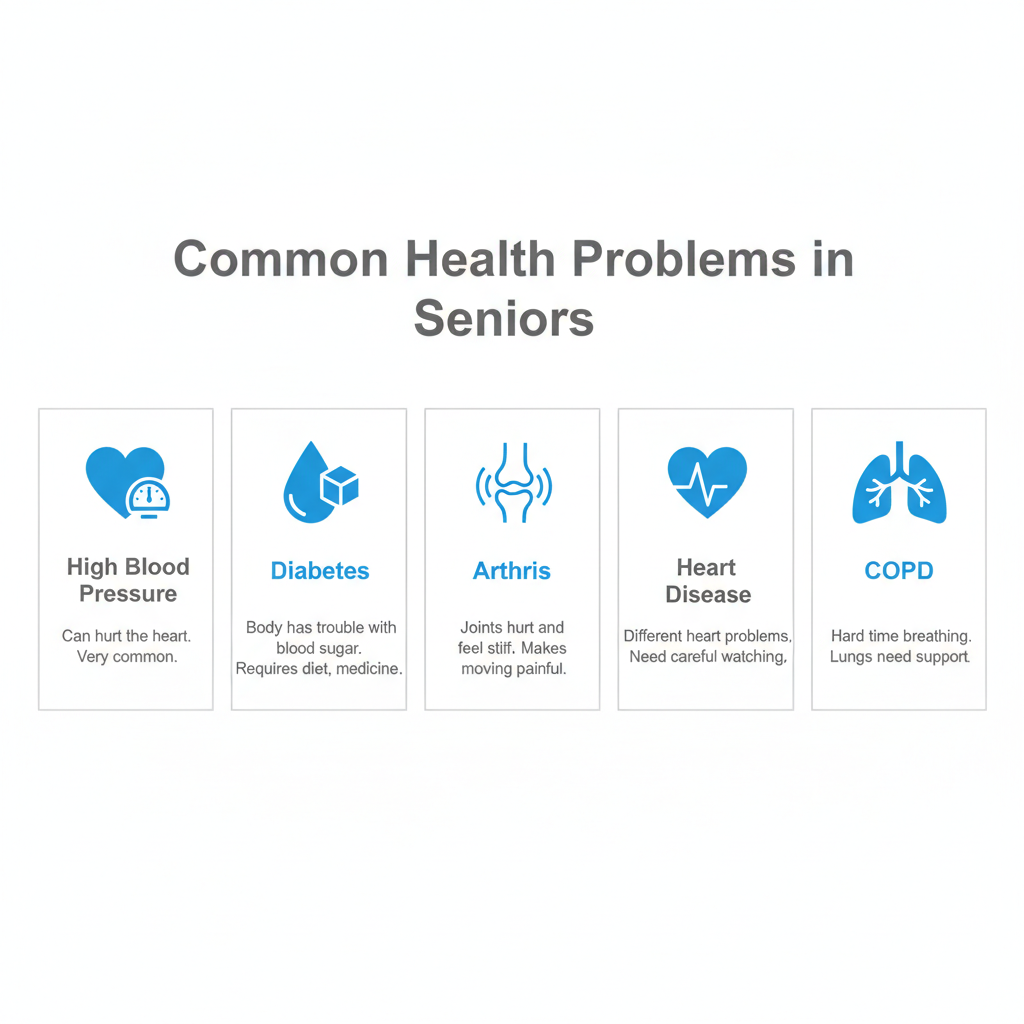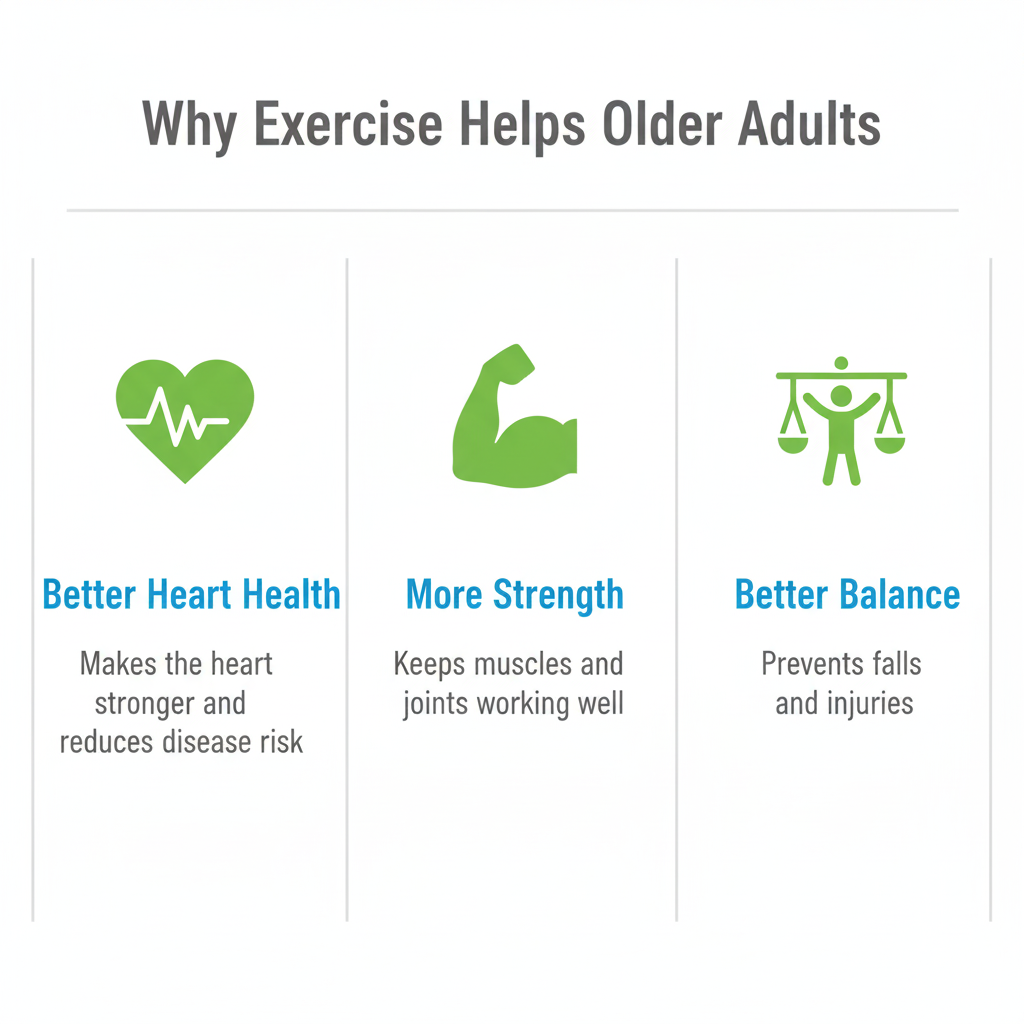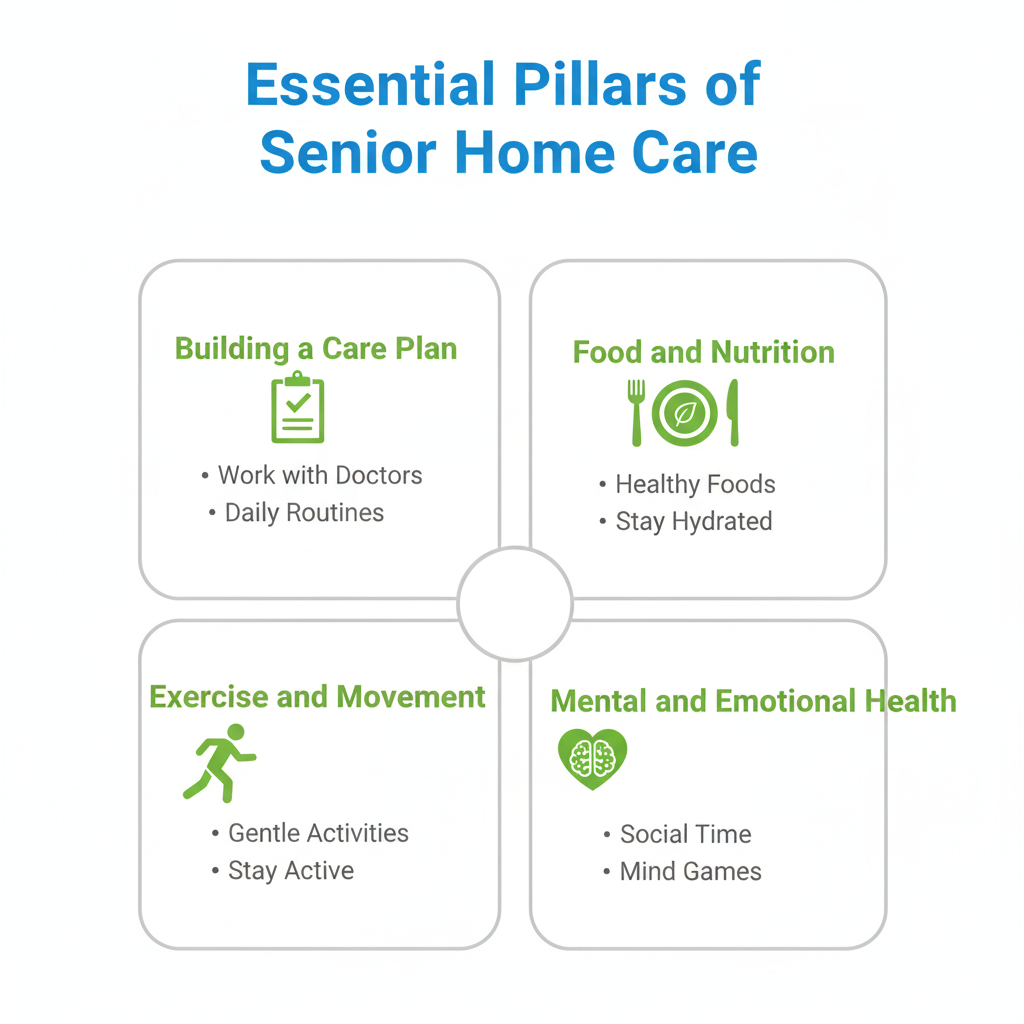Getting older brings new health challenges. Many seniors live with ongoing health issues every day. These problems can make life harder and less fun. This guide shows you how to help elderly people manage their health conditions at home.
DrMorepenHome.com helps families care for older loved ones. They offer tools and advice to make home care easier. Their products and services help families give the best care possible.
Understanding Health Problems in Older Adults
Older adults often face several health issues at once. Knowing about these problems helps families give better care at home.
Common Health Problems in Seniors
High Blood Pressure: This can hurt the heart if not treated right. Many seniors have this problem.
Diabetes: The body has trouble with blood sugar. People with diabetes need special diets and medicine.
Arthritis: Joints hurt and feel stiff. This makes moving around hard and painful.
Heart Disease: Different heart problems that need careful watching and treatment.
COPD: Makes breathing hard. People with COPD need help keeping their lungs working well.

How Ongoing Illness Affects Seniors
Long-term illness changes how seniors live. Common effects include:
- Body Problems: Less strength and trouble moving around
- Feeling Sad or Worried: Health problems can cause stress and sadness
- Less Social Time: Seniors may avoid friends and family
- Money Stress: Medicine and care costs can add up quickly
Warning Signs to Watch For
Spotting problems early helps manage health conditions better. Look for these warning signs:
- Sudden weight loss or not wanting to eat
- Feeling tired all the time
- Trouble walking or more falls than usual
- Hard time breathing or chest pain
- Memory problems or confusion
%20(1).png)
Making Homes Safe for Elderly Care
The right home setup keeps seniors safe and comfortable. Small changes can make a big difference.
Creating a Safe Living Space
A safe home prevents accidents and injuries:
- Clear Walkways: Remove things that cause trips and falls
- Good Lighting: Bright lights help prevent accidents
- Secure Rugs: Tape down loose rugs and hide electrical cords
Important Home Changes for Senior Care
These changes help seniors stay safe:
- Grab Bars: Put these in bathrooms and on stairs for support
- Non-slip Mats: Use in showers and tubs to prevent falls
- Bed Height: Make sure beds are easy to get in and out of
Helpful Technology for Seniors
Modern tools make life easier:
- Medical Alert Systems: Get quick help in emergencies
- Smart Home Devices: Automatic lights and temperature control
- Walking Aids: Canes, walkers, and wheelchairs help with movement
Building a Care Plan for Health Problems
Good planning helps manage illness better. Work with doctors and create daily routines that fit each person's needs.
Working with Doctors
Talk openly with healthcare workers:
- Regular Visits: See doctors often to check health and change treatments
- Health Records: Keep track of symptoms, medicines, and medical history
- Expert Help: Talk to specialists about specific health problems
Planning Daily Activities
Good daily routines help physical and mental health:
- Same Schedule: Eat meals and take medicine at the same times each day
- Mix Rest and Activity: Add gentle exercise to daily routines
- Brain Games: Do puzzles, read books, or play games to keep the mind sharp
Managing Medicine
Taking medicine correctly is very important:
- Pill Organizers: Use weekly pill boxes to avoid confusion
- Reminders: Set alarms for medicine times
- Doctor Check-ins: Make sure all medicines work well together
Food and Nutrition for Seniors with Health Problems
Good nutrition helps manage health conditions and gives seniors more energy. The right foods can make symptoms better and improve daily life.
Best Foods for Managing Health Problems
Healthy eating is key for seniors with ongoing illness:
- Lean Protein: Fish, chicken, and beans help keep muscles strong
- Fruits and Vegetables: Different colors provide vitamins the body needs
- Whole Grains: Brown rice and oats give steady energy
- Healthy Fats: Avocados, nuts, and olive oil help the heart
Talk to a food expert to create meal plans for specific health needs.
Staying Hydrated and Watching What You Eat
Seniors need plenty of fluids. Not drinking enough water can make health problems worse. Good drink choices include:
- Water: The best choice for daily fluid needs
- Herbal Tea: Tasty option without caffeine
- Soup Broth: Provides both food and fluids
Keep track of what seniors eat to spot problems and make changes when needed.
Vitamins and Supplements for Seniors
Sometimes seniors need extra vitamins:
- Calcium and Vitamin D: Keep bones strong and prevent breaks
- B Vitamins: Help with energy and brain function
- Omega-3: Good for heart and brain health
Always talk to a doctor before starting any vitamins to avoid problems with other medicines.
Exercise and Movement for Senior Health
Moving the body every day helps manage health problems and makes seniors feel better. Exercise keeps people strong and improves mood.
Why Exercise Helps Older Adults
Regular movement provides many benefits:
- Better Heart Health: Makes the heart stronger and reduces disease risk
- More Strength: Helps keep muscles and joints working well
- Better Balance: Prevents falls and injuries
Exercise also makes people feel happier by creating good brain chemicals.

Safe Exercise for Seniors
Safety comes first when planning exercise:
- Walking: Easy on the body and good for the heart
- Chair Exercises: Perfect for people who have trouble standing
- Tai Chi or Yoga: Gentle movements that improve balance and reduce stress
Always check with a doctor before starting new exercise programs.
Keeping Seniors Moving
Staying active helps seniors do daily tasks on their own:
- Stretching: Keeps joints flexible and muscles loose
- Balance Practice: Simple exercises like standing on one foot reduce fall risk
Regular movement helps seniors feel confident and independent.
Mental and Emotional Health for Chronic Conditions
Taking care of the mind and feelings is just as important as physical health. Seniors with ongoing health problems need support for their emotions too.
Helping with Sadness and Worry
Health problems can make seniors feel sad or scared:
- Counseling: Talking to professionals helps learn ways to cope
- Mindfulness: Meditation and deep breathing reduce stress
- Social Time: Spending time with others fights loneliness
A caring environment where seniors feel heard makes a big difference in mental health.
Brain Activities for Seniors
Keeping the mind active helps preserve thinking skills:
- Puzzles and Games: Make the brain work and solve problems
- Reading: Learning new things and discussing ideas with others
- Art Projects: Creative activities provide a way to express feelings
Choose activities that match interests and abilities for the best results.
Family and Friend Support
Strong relationships help seniors manage health challenges:
- Family Time: Regular visits and talks strengthen emotional bonds
- Support Groups: Meeting others with similar problems provides comfort
- Volunteer Work: Helping others gives a sense of purpose and meaning
Good social support greatly improves both emotional and mental well-being.
Professional Home Care Services
Getting professional help at home can make life much better for seniors with health problems. It also gives family caregivers a break.

Picking the Right Caregiver
Choose home care carefully by looking at:
- Training and Experience: Make sure caregivers know how to help seniors
- Personality Match: Find someone who gets along well with your loved one
- Flexible Services: Pick services that can change as needs change
Home Helpers vs. Nurses
Different levels of care meet different needs:
- Home Health Aides: Help with daily tasks like bathing, dressing, and cooking
- Skilled Nurses: Provide medical care like wound care and giving medicines
Choose based on what type of help is needed most.
.png)
Benefits of Professional Home Care
Getting professional help offers several advantages:
- Steady Care: Makes sure care happens regularly and reduces hospital trips
- Personal Attention: Care plans made just for each person's needs
- Family Relief: Gives family members time to rest and avoid burnout
Companies like DrMorepenHome.com provide quality support that makes life better for seniors at home.
Conclusion
Managing health problems in older adults takes careful planning and good support. Understanding what seniors need helps caregivers create caring environments that put health and happiness first. The ideas in this guide cover many parts of elderly care, from making homes safe to ensuring good nutrition and mental health support.
DrMorepenHome.com helps families with tools and advice designed to make life better for older adults. They focus on providing reliable healthcare resources that help caregivers handle the challenges of managing ongoing illness with confidence. The goal is not just to manage conditions but to improve the overall life experience of seniors. Good care approaches help our loved ones enjoy comfortable, fulfilling lives at home.
Frequently Asked Questions (FAQs)
How can I help an elderly person with many health problems?
Start with good communication and a complete care plan. Work with doctors to understand their specific needs and check their condition regularly. Managing medicines is crucial - use pill organizers and set reminders. Make the home safe and comfortable while encouraging regular exercise and social time.
What resources help with elder care at home?
Many resources exist for home elder care, from professional services to community support groups. Organizations like DrMorepenHome.com offer helpful insights and medical products for managing health conditions. Many government and non-profit programs also provide information, support, and money help for families caring for elderly relatives.
How do I balance independence and safety in senior care?
Balance independence with safety by respecting the elderly person's choices while keeping them safe. Make proper home changes like installing grab bars and using medical alert systems. Let seniors control activities they handle well, offering help only when needed. Check their abilities regularly and talk openly to adjust care plans as needs change.
What diet changes should seniors with health problems make?
Diet plays a big role in managing health problems. Create eating plans for individual needs, like less salt for high blood pressure or balanced carbs for diabetes. Focus on healthy foods like fruits, vegetables, lean proteins, and whole grains. Staying hydrated is vital. Talk to doctors about any needed vitamins to make sure seniors get the nutrients they need.
When should professional home care services be considered?
Consider professional home care when an elderly person's needs are more than the family can handle. This happens when health conditions need complex medical care, there are memory problems, or when the main caregiver feels overwhelmed. In-home care services from skilled nurses or health aides provide specialized support, letting seniors stay safely at home while getting the care they need.
.png)



.png)
.png)
.png)
.png)
.png)
.png)
.png)

.png)
.png)
.png)

.png)
.png)
.png)
.png)
.png)
.png)

.png)
.png)

.png)
.png)
.png)

.png)

.png)


.png)







